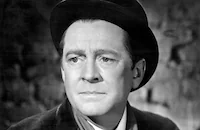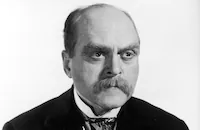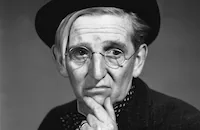365 Nights in Hollywood
Brief Synopsis
Cast & Crew
George Marshall
James Dunn
Alice Faye
Frank Mitchell
Jack Durant
John Bradford
Film Details
Technical Specs

Synopsis
Failed "boy wonder" director Jimmie Dale is given a job by opportunist J. Walter Delmar as an acting teacher at The Delmar Academy of Motion Picture and Dramatic Arts, which supplies instruction as long as its pupils provide money. One day, while Delmar is visited by Adrian Almont, a movie star who allows Delmar to use his name for advertising, pretty Alice Perkins arrives, accompanied by ice men Percy and Clarence, and asks to be admitted to the school. After a false start teaching Alice to act, Jimmie discovers during a party that night that she is a good singer. The next morning, Alice is given a ride to school by wealthy Frank Young, and when they arrive, Delmar and Adrian convince Frank to provide seventy-five thousand dollars for a picture to be directed by Jimmie and starring Adrian and Alice. Jimmie is informed about the shady deal, which involves his using forty-five thousand dollars for the picture and splitting the left-over money with Delmar and Adrian. Jimmie reluctantly agrees but is unaware that Delmar and Adrian intend to embezzle everything and set him up as the fall guy. At a rehearsal that night, Jimmie berates Alice for hours until she perfects her singing style, which later is a hit during filming. Jimmie has trouble with Adrian, however, when he arrogantly refuses his directions. Jimmie then talks with Delmar and Adrian and, when they ask for their cut of the production funds, tells them that all of the money is going into the film, despite their attempts to frame him. Soon after, Delmar tells the district attorney that Jimmie is embezzling the funds himself, but Jimmie's careful bookkeeping proves Delmar wrong, and suspicion falls on Delmar for several complaints about the school. Jimmie examines his budget and finds out that he must finish shooting the picture the next day, before he runs out of funds. Jimmie then tries to make up with Alice by asking her out, but finds that she already has a date with Adrian. At the restaurant that night, Adrian drunkenly tells Alice he intends to sabotage the picture by not showing up the next day. He prevents Alice from phoning Jimmie to warn him, and then takes her to his isolated home. Alice fends off his advances until he passes out, and when Clarence and Percy find her the next morning, the three of them take Adrian to the studio, arriving just as Jimmie is about to give up. Jimmie refuses to let Alice explain and rehearses the final number with himself playing Adrian's part. After the rehearsal, Adrian refuses to perform, and the exasperated Jimmie decks him. A cameraman films the fight and gives Jimmie the idea to use it in the picture as a novel ending. Pleased with the solution, Jimmie then finds out about Alice's attempts to save the picture and rushes to her dressing room. After he apologizes, the antagonistic sweethearts admit their feelings for each other and become engaged.

Director

George Marshall
Cast

James Dunn

Alice Faye
Frank Mitchell
Jack Durant
John Bradford

Grant Mitchell
Frank Melton

John Qualen
Ray Cooke
Tyler Brooke
Paul Mcvey
Al Klein
Larry Fisher
Russ Clark
Patrick Moriarity
Perry Ivins
Richard Whiting
Frank Sully
Gay Seabrook
Helen Gibson
Ben Hall
Dorothy Bay

James Conlin
Harry Wilson
Paul Schwegler
Betty Stockton
Gladys Johnson
Jean Fursa
Blanca Vischer
Olga Borget
Helen Lindeloff
Bo Ling
Frances Carlon
Paul Parry
Betty Bryson
Gloria Roy
Ruth Peterson

Frank Conroy
Ernest Wood

Addison Richards
Brooks Benedict
Harry Fox
Jay Eaton
Carl Stockdale
Gene Morgan

Arthur Housman
Margaret Brayton
Enid Gray
Jessie Pringle

Ethel Wales
Lorraine Rugg
Max Wagner
Duke Burgess
Donald Brown
Warren Crosby
Bud Carpenter
Ed Stanbridge
James Gonzalez
Ted O'shea
Tommy Murray
Crew
Gordon Carveth
Sidney Clare
William Conselman
Duncan Cramer
Bernard Freericks
Duke Green
Albert Hogsett
Harry Jackson
Henry Johnson
Samuel Kaylin
Barbara King
Sammy Lee
Harvey Perry
Royer
Garland Weaver
Richard Whiting
Sol M. Wurtzel

Film Details
Technical Specs

Articles
365 Nights in Hollywood
The scenario, which lifted the title and nothing else from James Starr's collection of Tinseltown short stories, opens on one-time wonderboy director Jimmy Dale (James Dunn), now living out of a bottle due to the flops that scuttled his career. He finds himself receiving a hand up out of the gutter from J. Walter Delmar (Grant Mitchell), the proprietor of a shady acting school, who wants to trade on what's left of Dale's reputation to sucker prospective enrollees.
One such pigeon is Alice Perkins (Faye), fresh off the bus from Peoria and fully expecting Delmar's academy to gain her entree to the business. Dale loses patience early with the raw recruit, but comes to see her potential. As the story progresses, Delmar hungrily makes the acquaintance of a hayseed heir (Frank Melton), whom he wheedles into staking a low-budget production. Delmar then sells Dale on the idea of a comeback vehicle with Alice as the lead, all the while planning to kick back a significant chunk of the budget. Dale has his hands full pulling together the project, polishing Alice's skills, and trying to stay a jump ahead of Delmar and his unctuous leading man and co-conspirator (John Bradford).
The long portfolio of director George Marshall is marked with the great (Destry Rides Again), the near-great and the not-so-great, and 365 Nights In Hollywood trends toward the lower end of the scale. The film presents Faye in the manner in which Fox packaged her in the early years of her career, as essentially an own-label Harlow with hair bleached platinum and plucked eyebrows. Her performance here is indicative of what audiences got from her all through her peak period; enough acting skill to get by until the production numbers, where her throaty delivery and pert radiance would carry the day.
Dunn brought to his role the affability that Fox put to best use in Shirley Temple's earliest vehicles and many more from the studio's musical output in the early to mid '30s. With sad irony, his art here wound up presaging life for Dunn; by the decade's end, Fox was curtailing its musical output, his opportunities grew more infrequent, and he began to lose his war with his own private demons. He did receive validation when he captured the Best Supporting Actor Oscar for portraying the weak-willed father in A Tree Grows In Brooklyn (1944), but the accolade didn't restore his career's momentum.
Grant Mitchell is capable as the sleazy Delmar, and John Ford regular John Qualen has his moments as Dunn's ally on the "faculty." Less welcome are the comic relief efforts of the knockabout clowns Frank Mitchell and Jack Durant, who appeared in various Fox musicals of the period, and have lapsed into deserved obscurity in the generations since. Their shtick, which was mainly comprised of wrestling one another into the scenery at the drop of a hat, makes the Stooges look like Noel Coward, and gets old extremely fast. For the Alice Faye archivist, 365 Nights In Hollywood qualifies as a must-have; for everybody else, caveat emptor.
While an exceptional effort was made to clean up the audio for this release, there was no such luck with respect to the visuals. Mastered from a complete 35mm print in the possession of Faye biographer Frank Moshier, the scratches and mottling betray the master's age, but aren't so prevalent as to detract from the viewing experience. The sole extras are trailers for several of the horror/exploitation films from Williams' archives that are available on DVD through Image.
For more information about 365 Nights In Hollywood, visit Image Entertainment. To order 365 Nights in Hollywood, go to TCM Shopping.
by Jay Steinberg

365 Nights in Hollywood
Quotes
Trivia
Only the title of Jimmy Starr's book of short stories was used.
Notes
According to the Twentieth Century-Fox Records of the Legal Department at the UCLA Theater Arts Library, only the title of Jimmy Starr's book and his name were used in the making of this film, and "the production which bears this title is in no way similar to Starr's original work." According to contemporary news items, the film originally was to star Claire Trevor, who was later replaced by Lilian Harvey, and the film was be directed by James Tinling. A Motion Picture Herald news item listed other potential cast members Victor Jory, Tito Coral, Mona Barrie and Harry Green, but they were not included in the final film. Hollywood Reporter production charts include Cora Sue Collins in the cast, but her participation in the final film has not been verified.














